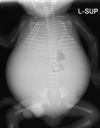A Neonate with Mucopolysaccharidosis Type VII with Intractable Ascites
- PMID: 36936745
- PMCID: PMC10019997
- DOI: 10.1055/a-2028-7784
A Neonate with Mucopolysaccharidosis Type VII with Intractable Ascites
Abstract
We report a case of a patient with severe fetal hydrops and refractory ascites, diagnosed as mucopolysaccharidosis type VII (MPS VII) by whole-exome sequencing, and discharged at 5 months of age after long-term ventilatory management. A male neonate was born by emergency cesarean section due to fetal distress at 30 1/7 weeks' gestation. Physical examination and X-rays revealed pleural effusion, ascites, and generalized edema, indicating severe fetal hydrops. He underwent tracheal intubation because of respiratory distress that was attributed to massive ascites, pulmonary hypoplasia, and pulmonary hypertension. He received mechanical ventilation and inhaled nitric oxide therapy. Prednisone, octreotide, and a factor XIII preparation were used as the treatment for ascites, and the ascites gradually decreased. He was extubated within 2 months of age. At 4 months of age, the results of whole-exome sequencing of the cord blood showed a compound heterozygous mutation in the GUSB gene, the gene responsible for MPS VII. Enzyme replacement therapy was initiated, and the ascites was resolved. Careful systemic management, including lung-protective respiratory management and the early establishment of nutrition, is important for the long-term survival of infants with fetal hydrops, and early aggressive workup, including whole-genome sequencing for the cause, should be performed in the case of refractory ascites.
Keywords: GUSB gene; MPS VII; fetal hydrops; refractory ascites.
The Author(s). This is an open access article published by Thieme under the terms of the Creative Commons Attribution-NonDerivative-NonCommercial License, permitting copying and reproduction so long as the original work is given appropriate credit. Contents may not be used for commercial purposes, or adapted, remixed, transformed or built upon. ( https://creativecommons.org/licenses/by-nc-nd/4.0/ ).
Conflict of interest statement
Conflict of Interest None declared.
Figures
References
-
- Sly W S, Quinton B A, McAlister W H, Rimoin D L. Beta glucuronidase deficiency: report of clinical, radiologic, and biochemical features of a new mucopolysaccharidosis. J Pediatr. 1973;82(02):249–257. - PubMed
-
- Poorthuis B J, Wevers R A, Kleijer W J.The frequency of lysosomal storage diseases in The Netherlands Hum Genet 1999105(1-2):151–156. - PubMed
-
- Van Dorpe J, Moerman P, Pecceu A, Van den Steen P, Fryns J P. Non-immune hydrops fetalis caused by beta-glucuronidase deficiency (mucopolysaccharidosis VII). Study of a family with 3 affected siblings. Genet Couns. 1996;7(02):105–112. - PubMed
Publication types
LinkOut - more resources
Full Text Sources



